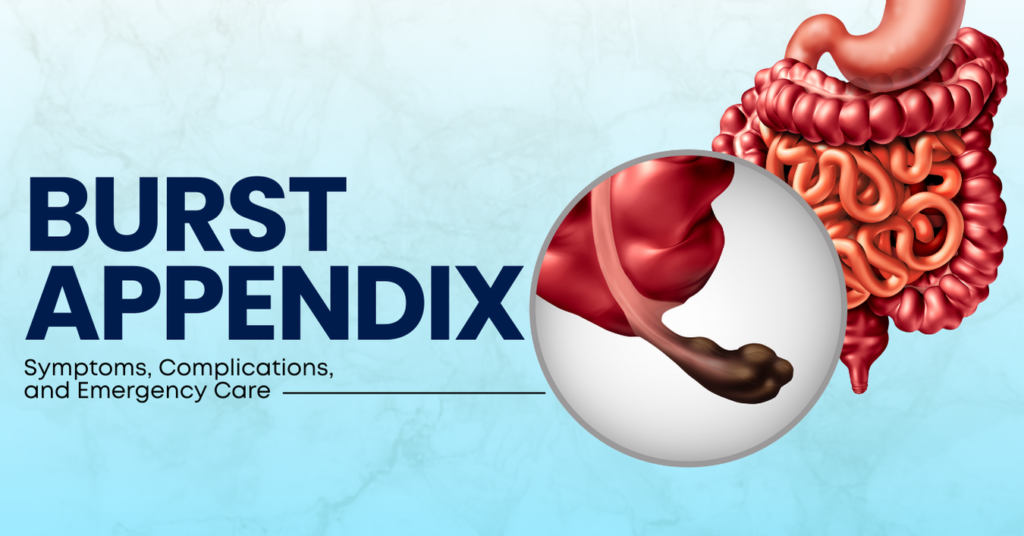Burst Appendix: Symptoms, Complications, and Emergency Care

What Happens When Your Appendix Ruptures?
A burst appendix (ruptured appendicitis) occurs when an inflamed appendix tears, spilling infectious bacteria into the abdominal cavity. This triggers a chain reaction of life-threatening complications, including peritonitis and sepsis. Timing is critical—delayed treatment can lead to organ failure or death.
Symptoms of a Burst Appendix
Appendicitis pain often worsens over 24–72 hours before rupture. However, once the appendix bursts, symptoms change dramatically:
Sudden Relief of Pain (Followed by Worsening):
- The initial sharp pain in the lower right abdomen may temporarily ease as the appendix ruptures, but this is a dangerous false improvement.
- Within hours, pain returns and spreads across the entire abdomen.
High Fever (Over 102°F):
- A spiking fever indicates a severe infection. Chills and sweating often accompany this.
Severe Abdominal Swelling and Rigidity:
- The belly becomes tender, bloated, and hard to the touch.
Nausea, Vomiting, and Inability to Eat/Drink:
- Persistent vomiting and loss of appetite signal a worsening condition.
Rapid Heart Rate and Breathing:
- The body’s response to infection increases heart and respiratory rates.
Life-Threatening Complications
A ruptured appendix can cause two critical conditions:
- Peritonitis:
- Infection of the abdominal lining causes extreme pain, fever, and swelling. Without surgery, toxins can overwhelm the body.
- Sepsis:
- Bacteria entering the bloodstream triggers a systemic inflammatory response. Symptoms include confusion, low blood pressure, and organ failure.
Emergency Treatment: What Doctors Do Immediately
Surgery (Appendectomy):
- Surgeons remove the ruptured appendix and clean the abdominal cavity to prevent further infection.
- Laparoscopic surgery is common, but open surgery may be needed for severe cases.
Antibiotics:
- High-dose IV antibiotics are administered to combat infection.
Hospital Monitoring:
- Patients are closely watched for signs of sepsis or organ damage.
FAQs About a Burst Appendix
- How long can you survive with a burst appendix?
- A ruptured appendix requires treatment within hours. Without surgery, sepsis can be fatal in days.
- Can a burst appendix heal itself?
- No. The infection will spread without surgery and antibiotics.
- What’s the recovery time after surgery?
- Recovery takes 2–6 weeks, depending on rupture severity. A longer hospital stay is needed if sepsis occurs.
- Can you prevent a burst appendix?
- Early treatment of appendicitis is key. Never ignore worsening abdominal pain.
- Are there long-term complications?
- Scar tissue or bowel obstructions may develop post-surgery, but these are rare with prompt care.
What to Do If You Suspect a Burst Appendix
- Seek emergency care immediately.
- Avoid eating, drinking, or taking painkillers, as these can delay diagnosis.
- Share your full symptom timeline with doctors (e.g., pain migration, fever onset).
Conclusion
A burst appendix is a race against time. Recognizing symptoms like sudden pain shifts, high fever, and severe swelling can save lives. Do not wait—rush to the ER if you suspect a rupture. With swift surgery and antibiotics, most patients recover fully.
Act fast: Your health depends on it.



